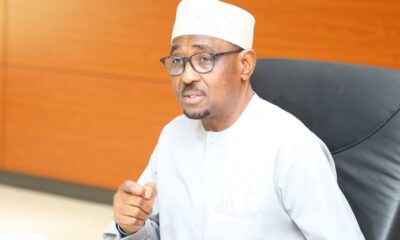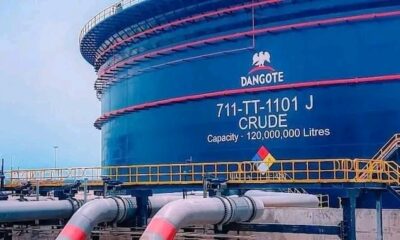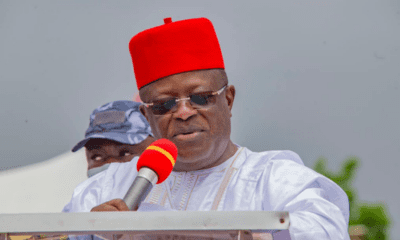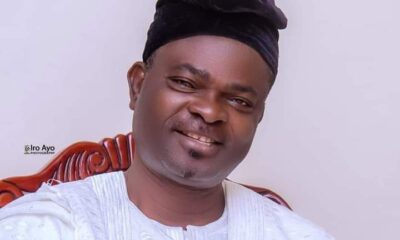Top Story
Again, Dangote Refinery crashes diesel, aviation fuel prices

…Pegs N940, N980/ltr respectively
…As FG unveils initiatives to attract $10bn investments in 18 months
…NNPC Ltd/Newcross resume production at Awoba field
In an unprecedented move, the Dangote Refinery has further lowered the price of Diesel and Aviation fuel.
This is coming seven days after the refinery crashed the price of Diesel to N1,000. Previously, the Refinery had three weeks ago while rolling out the products supplied at a substantially reduced price of N1,200 per litre.
This marks the third major reduction in diesel price in less than three weeks when the product sold at N1,700 to N1,200 and also a further reduction to N1,000 and now N940 for diesel and N980 for aviation fuel per litre.
The new price was made known in a statement made available to Nigerian NewsDirect on Tuesday.
The price change of N940 is applicable to customers buying five million litres and above from the refinery, while the price of N970 is for customers buying one million litres and above.
Speaking on the new development, the Head of Communication, Mr Anthony Chiejina, explained that the new price is in consonance with the company’s commitment to cushion the effect of economic hardship in Nigeria.
“I can confirm to you that Dangote Petroleum Refinery has entered a strategic partnership with MRS Oil and Gas stations, to ensure that consumers get to buy fuel at affordable price, in all their stations be it Lagos or Maiduguri. You can buy as low as 1 litre of diesel at N1,050 and aviation fuel at N980 at all major airports where MRS operates.”
He further stated that the partnership will be extended to other major oil marketers.
“The essence of this is to ensure that retail buyers do not buy at exorbitant prices.
“The Dangote Group is committed to ensuring that Nigerians have better welfare and as such, we are happy to announce these new prices and hope that it would go a long way to cushion the effect of economic challenges in the country.”
Nigerian President Bola Tinubu had also commended Mr Dangote for the initial price reduction, describing it as an “enterprising feat.”
Reacting to the latest development, The Director General of the Manufacturers Association of Nigeria (MAN), Mr Ajayi Kadiri, said that “The decision of Dangote Refinery to first crash the price from about N1,750/litre to N1,200/litre, N1,000/litre and now N940 is an eloquent demonstration of the capacity of local industries to positively impact the fortunes of the national economy.”
He added that, “The trickle down effect of this singular intervention promises to change the dynamics in the energy cost equation of the country, in the midst of inadequate and rising cost of electricity.
“The reduction will have far-reaching effects in critical sectors like industrial operations, transportation, logistics, and agriculture, contributing to easing the high inflation rate in the country; a lot of companies will be back in operation.”
…NNPC Ltd, Newcross resume production at Awoba Field
In the same vein, the Nigerian National Petroleum Company Limited (NNPC Ltd) and its Joint Venture partner in the Awoba Unit Field, Newcross Exploration and Production Ltd, have restarted production from the Awoba field.
The Awoba Field was earlier shut down in February 2022 due to evacuation issues and crude oil theft and hasn’t contributed to the nation’s oil production since 2021.
The oil production in Nigeria has been experiencing significant decline with the latest being 1.32 million barrels per day in February to 1.23 in March, according to data from the Organisation of Petroleum Exporting Countries (OPEC)’s latest monthly oil market report.
The NNPC Ltd in a statement on Tuesday however disclosed that it commenced production on the field on April 13, 2024 as part of its efforts to boost the production efforts in the country.
It noted that production from the field has averaged 8,000 barrels per day and is expected to plateau at 12,000 per day at full ramp up within 30 days.
Awoba is also expected to significantly boost gas supply to the power sector and other gas-based industries.
The Awoba Unit which straddles OMLs 18 and 24 is located in the mangrove swamp south of Port Harcourt, Rivers State. Both OML 18 and OML 24 assets are under the management of the NNPC Upstream Investment Management Services (NUIMS).
NNPC Ltd has been recording a string of production successes from the JV portfolio which have significantly lifted overall national production. Besides the recent start of production at the Madu Field by the NNPC Ltd/First E&P JV, the company has achieved the restart of production at OMLs 29 and OML 18 in late 2023 which have steadily contributed an average of 60,000bpd to the nation’s production output since their restart.
Speaking on the development, the Group Chief Executive Officer, Mallam Mele Kyari, ascribed the achievement to the President Bola Ahmed Tinubu administration’s success in providing an enabling operating environment for businesses to thrive.
He expressed appreciation to all stakeholders (staff, operators, host communities, government security agencies, and private security contractors) who played a pivotal role in achieving the feat.
…FG unveils initiatives to attract $10bn investments in 18 months
In a move to further revitalise the oil and gas industry’s contribution to the Nigerian Economy, Minister of Finance and Coordinating Minister of the Economy, Wale Edun, presided over a signing ceremony at the Federal Ministry of Finance headquarters in Abuja endorsing the Consolidated Guidelines for the implementation of Fiscal Incentives for the Oil & Gas Sector – a cornerstone of the Presidential Directive aimed at enhancing the Nigerian oil & gas sector’s global competitiveness whilst stimulating economic growth.
As disclosed during the signing, the Presidential Directives were developed and coordinated by the Special Adviser to the President on Energy, Mrs. Olu Verheijen to ensure a competitive framework for the Nigerian oil & gas industry. These Consolidated guidelines for the fiscal incentives are based on extensive collaboration across Finance and Petroleum Ministries and involved several key regulatory bodies including the Federal Inland Revenue Service (FIRS), the Nigerian Upstream Petroleum Regulatory Commission (NUPRC), and the Nigerian Midstream and Downstream Petroleum Regulatory Authority (NMDPRA).
According to Mrs. Verheijen, these new measures have been designed to deliver a competitive Internal Rate of Return (IRR) for Oil & Gas Projects and attract over $10 billion in new investments within the next 12-18 months. They also underscore Nigeria’s commitment to reaching its long term oil production target of 4 million barrels per day whilst enhancing the reliability of gas supply to boost export earnings and fuel Nigeria’s industrialization.
Mrs. Verheijen disclosed that among the guidelines signed were the NUPRC Guideline on Hydrocarbon Liquids Content in a Non-Associated Gas (NAG) Field, essential for accurately categorising and quantifying the hydrocarbon liquid content in these fields. Additional guidelines focused on the applicability of tax credits and allowances for Non-Associated Gas Greenfield Development and the Midstream Capital and Gas Utilization Allowance, providing taxpayers with clarity on the computation of these benefits.
HM Edun, in his remarks, thanked President Bola Ahmed Tinubu for signing the directive in February 2024 to engender growth in the Nigerian oil and gas sector, which had stagnated for over the last decade.
He also emphasised the potential of the guidelines, saying, “The idea is to create an atmosphere conducive to international competitiveness such that investment comes in. And in this case, we know it’s foreign direct investment.”
The signing ceremony was attended by various stakeholders, including NNPC Limited, Oil Producers Trade Section (OPTS) and the Independent Petroleum Producers Group (IPPG), further highlighting Nigeria’s unified approach toward reinvigorating its oil and gas sector.
Top Story
Lagos-Calabar Highway: Atiku faults FG’s demolition of properties


..Accuses Tinubu of prioritising business over public good
…Says demolition of Landmark, others unfriendly to foreign Investors
…Says N1trn released without approval, accuses FG of financial recklessness
By Sodiq Adelakun
Former Vice President and Peoples Democratic Party (PDP) presidential candidate, Atiku Abubakar, has strongly condemned the demolition of properties in the Oniru corridor, including parts of Lagos State’s landmark, tourist, and recreational attractions, to make way for the Coastal Highway project.
Recall that Labour Party (LP) presidential candidate in the 2023 general election, Peter Obi, faulted the ongoing Lagos-Calabar Coastal Highway project, describing it as not necessary.
Obi had earlier condemned the commencement of the multi-trillion naira coastal highway project, when most internal roads in the country were impassable.
Meanwhile, Atiku criticised the lack of proper notification and the Tinubu-led government’s handling of the project, which he believes is a major hindrance to Nigeria’s ability to attract foreign direct investment.
In a statement issued on Sunday by his media adviser, Paul Ibe, Atiku alleged that President Bola Tinubu and Gilbert Chagoury, the owner of Hitech, the contractor handling the highway project, are the sole driving forces behind the rapid progress of the Coastal Highway project.
He claimed that the contract was awarded in violation of procurement regulations, raising concerns about transparency and accountability.
Furthermore, Atiku highlighted a clear conflict of interest, pointing out that President Tinubu’s son and associates hold positions on the boards of companies owned by Gilbert Chagoury.
The former Vice President noted that “Tinubu’s son, Seyi, is a director on the board of CDK Integrated Industries, a subsidiary of the Chagoury Group, which manufactures ceramic tiles and sanitary towels.
Part of the statement reads, “The former Vice President restated that it has become obvious even to the undiscerning that the Lagos-Calabar Coastal Highway is being done in a hurry purely because of the business relationship between Tinubu and Gilbert Chagoury, the owner of Hitech, the contractor that was awarded the contract for the highway project in contravention of the procurement laws. It is on record that this project is the most expensive single project ever embarked upon by the Nigerian government.
“The fact that it is happening at a time when Nigeria is facing its worst economic crisis ever is a red flag.
“To add insult to injury, this project that is being done for more than $13bn was awarded without competitive bidding. From all indications, the so-called Badagry-Sokoto highway would be awarded similarly at an enormous cost to taxpayers purely because Tinubu has put his interest ahead of the Nigerian people.”
Atiku said the demolition of tourist and recreational facilities and other properties within the Oniru corridor, including parts of Landmark, without ample notice, is one of the reasons foreign direct investments continue to elude the country.
He reiterated that “rather than improving the ease of doing business, the Tinubu administration had shown to the world that his personal business interest and that of his family would always be prioritised over and above national interest.”
Atiku noted that investors observe the treatment of local businesses and would avoid regions where their investments lack protection.
The former PDP presidential candidate stressed, “Tinubu has been globetrotting in search of foreign direct investments. He claims to have secured over $30 billion from various companies, but none has been forthcoming. Rather, all manufacturing firms have been posting heavy losses while some are exiting due to his poorly implemented exchange rate unification policy with even Aliko Dangote describing it as a huge mess at the recent annual general meeting of Dangote Sugar Refinery.
“The IMF in its latest report stated that Nigeria will by the end of the year become the 4th largest economy in Africa behind South Africa, Egypt and Algeria, a disgraceful development for a nation which was the largest in Africa by a mile when the PDP left the stage in 2015.
“Investors are seeing how local businesses are being treated and will not come to a place where their investments will not be protected. In saner climes, businesses such as Landmark would have been given at least two years’ notice for effective planning. But Tinubu’s eagerness to satisfy his business partners impaired his ability to coordinate the project properly.”
In the same vein, he criticised the Tinubu administration’s handling of the Lagos-Calabar coastal highway project, calling it a “rushed” and “reckless” endeavor.
Atiku noted that the environmental impact assessment report was not completed, and the right of way for the 700 km stretch of the project was not secured.
He also pointed out that the project was converted from a public-private partnership (PPP) to a government-funded project without proper approval, and that over N1 trillion was released without National Assembly approval, ignoring the initial N500 million approved by the legislature.
Top Story
Corruption allegations: EFCC denies issuing list of ex-Govs under investigation


By Adeyanju Esther
In response to a recent flurry of reports circulating in various media outlets, the Economic and Financial Crimes Commission (EFCC) has come forward to disassociate itself from a purported list of ex-governors allegedly under investigation for corruption.
The commission has denied “any involvement in the dissemination of such information and asserts that no discussions regarding the investigation of ex-governors have taken place with any media entity.”
The report, titled ‘EFCC Releases Full List of 58 Ex-Governors that Embezzled N2.187 Trillion,’ has been deemed by the EFCC as false and misleading.
The Commission has clarified that it neither issued nor endorsed the aforementioned list, emphasising that it is a fabrication with motives known only to its authors.
“The EFCC urges the public to disregard the false report and warns the media against perpetuating inaccurate information that could mislead the public.
“Furthermore, the EFCC advises media organizations to exercise diligence in fact-checking and verifying information related to ongoing investigations by consulting directly with the commission to prevent the spread of false and misleading reports,” the Commission said.
Top Story
N5.9trn, $4.6bn loans: SERAP sues Sani, Wike
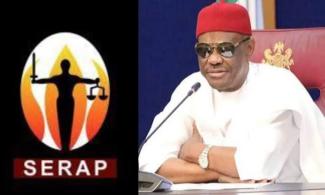

The Socio-Economic Rights and Accountability Project (SERAP) has filed a lawsuit against Nigeria’s governors and the Minister of the Federal Capital Territory, Abuja, Mr Nyesom Wike “over their failure to account for N5.9 trillion and $4.6 billion loans obtained by their states and the FCT, and to publish copies of the loan agreements, including details and locations of projects executed with the loans.”
The suit followed the disclosure last month by Governor Uba Sani of Kaduna State that the immediate past administration of Nasir El-Rufai left $587m, N85bn debt and 115 contractual liabilities, making it impossible for the state to pay salaries.
In the suit number FHC/ABJ/CS/592/2024 filed last Friday at the Federal High Court, Abuja, SERAP is asking the court to “direct and compel the governors and Mr Wike to account for N5.9trn and $4.6bn loans obtained by their states and the FCT and to publish copies of the loan agreements, location of projects executed with the loans.”
SERAP is also asking the court to “direct and compel the governors and Mr Wike to invite the Economic and Financial Crimes Commission [EFCC] and the Independent Corrupt Practices and Other Related Offences Commission [ICPC] to investigate the spending of all the loans obtained to date by their states and the FCT.”
In the suit, SERAP is arguing that, “It is in the public interest to grant the reliefs sought. Nigerians have the right to see and scrutinise the loan agreements and know the details of how the domestic and external loans obtained by the governors and FCT minister are spent.”
According to SERAP, “Opacity in the spending of the loans obtained by the governors and Mr Wike would continue to have negative impacts on the fundamental interests of the citizens.”
SERAP is also arguing that, “Many states and the FCT are reportedly spending public funds which may include the loans obtained by them to fund unnecessary travels, buy exotic and bulletproof cars and generally fund the lavish lifestyles of politicians.”
SERAP is also arguing that, “Many states and the FCT are also allegedly mismanaging public funds which may include domestic and external loans obtained from bilateral and multilateral institutions and agencies.”
According to SERAP, “Many states and the FCT reportedly owe civil servants’ salaries and pensions. Several states are borrowing to pay salaries. Millions of Nigerians resident in the state and FCT continue to be denied access to basic public goods and services such as quality education and healthcare.”
According to SERAP, “Transparency in the spending of the loans obtained by the states and FCT is fundamental to increase accountability, prevent corruption, and build trust in democratic institutions with the ultimate aim of strengthening the rule of law.”
The suit filed on behalf of SERAP by its lawyers Kolawole Oluwadare, Kehinde Oyewumi and Ms Valentina Adegoke, read in part: “States and the FCT should be guided by transparency and accountability principles and proactively account for the loans obtained and publish copies of the loan agreements.
“Widely publishing copies of the loan agreements and spending details of the loans obtained would ensure that persons with public responsibilities are answerable to the people for the performance of their duties in the management of public funds.
“State governors and Mr Wike cannot hide under the excuse that the Freedom of Information Act is not applicable to their states and the FCT. The legal obligations to publish the information sought are also imposed by the provisions of the Nigerian Constitution and the African Charter on Human and Peoples’ Rights.
“According to Nigeria’s Debt Management Office, the total public domestic debt portfolio for the country’s 36 states and the Federal Capital Territory is N5.9 trillion. The total public external debt portfolio is $4.6 billion.
“The domestic and external loans obtained by the states and the FCT are vulnerable to corruption and mismanagement. The states and FCT have a responsibility to ensure transparency and accountability in how any loans obtained by the states and FCT are spent, to reduce vulnerability to corruption and mismanagement.
“Directing and compelling the states and FCT to publish copies of the loan agreements would allow Nigerians to scrutinise them, and promote transparency and accountability on the spending of public funds including the loans obtained.
“Providing and widely publishing the details of the spending of the domestic and external loans obtained by the states and FCT would enable Nigerians to effectively and meaningfully engage in the management of the loans.
“The constitutional principle of democracy also provides a foundation for Nigerians’ right to know the details of loan agreements and how the loans obtained are spent. Citizens’ right to know promotes openness, transparency, and accountability that is in turn crucial for the country’s democratic order.
“The effective operation of representative democracy depends on the people being able to scrutinize, discuss and contribute to government decision making, including on the spending of loans obtained by the states and FCT.
“To do this, they need information to enable them to participate more effectively in the management of public funds by their state governments and the FCT.
“The public interest in obtaining information about expenditures relating to the loans obtained by the states and FCT outweighs any privacy or other interest.
“The oversight afforded by public access to such details would serve as an important check on the activities of the states and FCT and help to prevent abuses of the public trust.
“There is a significant risk of mismanagement or diversion of funds linked to loans obtained by state governments and the FCT. The accounts of Nigeria’s 36 states and the FCT are generally not open to public scrutiny.
“The Nigerian Constitution, human rights and anti corruption treaties to which Nigeria is a state party also impose obligations on the states and FCT to prevent mismanagement or diversion of public funds including the loans obtained.
“Many years of allegations of corruption and mismanagement of public funds including the loans obtained by the states and FCT have contributed to widespread poverty, underdevelopment and lack of access to public goods and services.”
No date has been fixed for the hearing of the suit.
-
capital market2 years ago
Rt.briscoe, FBNH, Others halts negative performance of stock market
-
Finance3 months ago
Court orders Sen. Victor Umeh to repay N136m bank debt to AMCON
-



 Abuja Update2 months ago
Abuja Update2 months agoUNDP, FG partnership needed to achieve inclusion, equity- Minister
-
Abuja Update1 month ago
Banks drive stock market performance with N147bn gain
-



 Business2 weeks ago
Business2 weeks agoTingo Group unveils Tingo Electric, Tingo Cola drink at Lagos launch
-



 Health3 weeks ago
Health3 weeks agoCapacity training will reduce migration of health workers- NPHCDA
-
News4 months ago
Oil thieves sponsoring malicious media campaign against Navy – Spokesman
-



 Infotech1 month ago
Infotech1 month agoWorld Backup Day: NITDA urges Nigerians to ensure backup of data

